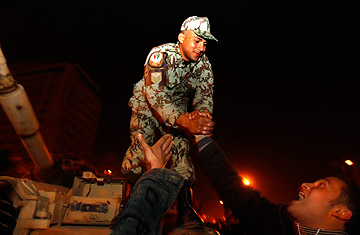
Anti-government protesters shake hands with an army officer atop a tank in Tahrir square, Cairo Feb. 11, 2011.
The resignation of Hosni Mubarak prompted widespread euphoria in Egypt's cities, where millions had massed on the streets for nearly three weeks to bring down Mubarak's three-decade-old regime. His departure is the product of an unprecedented display of courage and defiance by Egypt's people, but the hopes of many in the country still hinge on the actions of its military, which has assumed power and will preside over whatever transition that takes place.
Generals are used to delivering commands from top-down with the expectation of total obedience — unsurprisingly, they don't make the most natural democrats. Following the 1952 toppling of Egypt's British-backed monarchy by a group of young army officers, political authority in Cairo has always depended upon the military's backing. Never before has it sanctioned the development of a real democracy in the country.
But examples of coups elsewhere offer cause for optimism. In 1974, a coordinated revolt by disaffected officers in the Portuguese army against the country's repressive quasi-fascist government brought out tens of thousands into the streets. It was dubbed the Carnation Revolution as residents of Lisbon festooned the weapons of mutinous troops with flowers. Portugal's authoritarian regime collapsed, its overseas colonies — beset by violent insurgencies — were granted freedom, and elections led to a civilian-run center-left government. Democracy followed a year later in neighboring Spain, and has flourished in both countries since. Nigeria, Africa's most populous nation, endured 16 years of iron-fisted military rule, but its top brass eventually relented, allowing for a new constitution in 1999 that ushered in a credible, durable democracy. While the country is still burdened by corruption and longstanding ethnic and religious tensions, the army looks to have receded into the background.
In Egypt's case, that may be hoping for too much. It boasts the largest army in Africa and the military as an institution is deeply embedded in the workings of the state. Unlike the reviled security forces of the Interior Ministry, guilty of decades of arbitrary arrests, intimidation and torture, the army is well-regarded as a patriotic and proud custodian of the nation. But while many of the army's rank-and-file conscripts may be on the side of the protesters, some among its current top brass — as well as former key generals like Vice President Omar Suleiman — directly helped preserve Mubarak's reign and were its beneficiaries. It's too early to tell how they will adjust to the new political calculus.
Movements toward democracy have been sidelined by similar personalities in the past. In 1977, Pakistani General Muhammad Zia-ul-Haq stepped in during a rancorous political crisis and arrested Pakistan's elected Prime Minister Zulfiqar Ali Bhutto on the pretext of returning order to the country. Bhutto was executed a year later and Zia stayed in power until his death in 1988. In the aftermath of the Soviet invasion of Afghanistan, Zia became a key ally of the U.S., directing American aid to the anti-Moscow mujahedin while maintaining a draconian grip on Pakistan's politics throughout.
Over the decades, perhaps no military is more guilty of meddling with its country's fledgling civilian democracy than that of Thailand, the Southeast Asian land of smiles and coups. In 2006, the Royal Thai Army launched its latest intervention, ousting the controversial populist Prime Minister Thaksin Shinawatra and declaring martial law. Civilian rule has returned, but Thailand's political landscape is deeply polarized and fractious — a product, in part, of a society far too accustomed to seeing tanks on the streets at the first instance of crisis.
Of course, there's a limit to how instructive these external comparisons may be for Egypt, which is in the grips of a truly epochal moment. Commentators in the West have tended to place the protests in two vastly different historical paradigms. For some, the events in Egypt parallel the 1979 Iranian Revolution, where a mass uprising against a U.S.-backed dictator brought about an illiberal, Islamist theocracy. For optimists, Cairo represents the long-awaited Arab Spring, when, like the 1989 revolutions in Eastern Europe, democracy would bloom as authoritarian rule crumbled. In the first case, fears of Egypt's Muslim Brotherhood gaining the same political traction as Iran's Shi'ite mullahs have been considerably overblown. In the latter, the hope for any sort of peaceful democratic transformation still awaits the license of Egypt's Supreme Council of the Armed Forces.
That may yet come. The famous 1986 protests that toppled Ferdinand Marcos, the longtime dictator of the Philippines, gave to global lexicon the term "people power" — a phrase which has been repeatedly invoked when characterizing events in Tahrir Square. But for all the incredible scenes of mobilization and protest, little would have been achieved had it not been for the mutiny of a prominent general and the defense minister in Marcos' camp. In the beginning, the military bought into the post-Marcos democracy but, later, factions within the army launched a number of botched coups and even the attempted assassination of the country's sitting elected President. As ever, the men in uniform can be real arbiters for change, but democracy is rarely secure when preserved just through the barrel of a gun.
